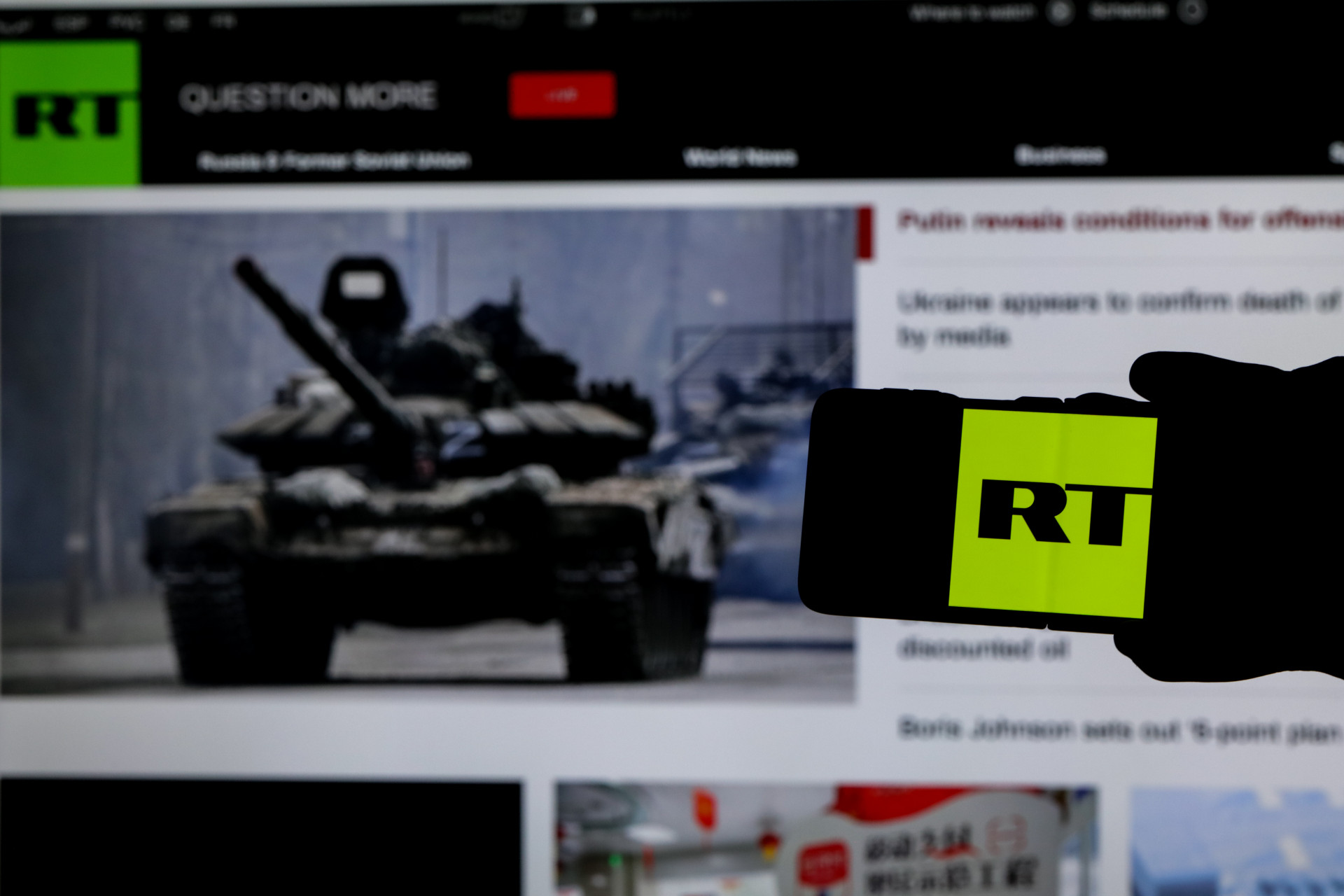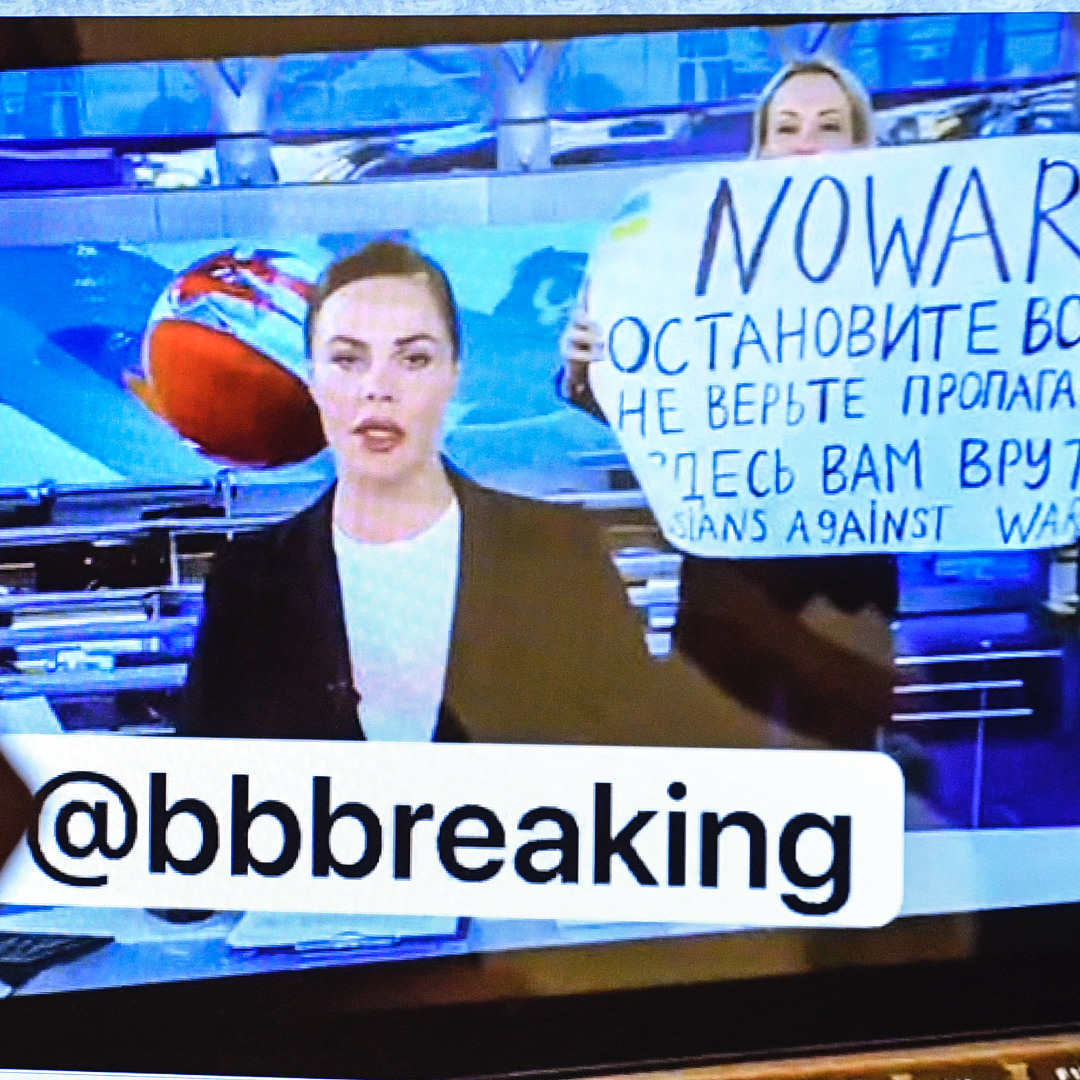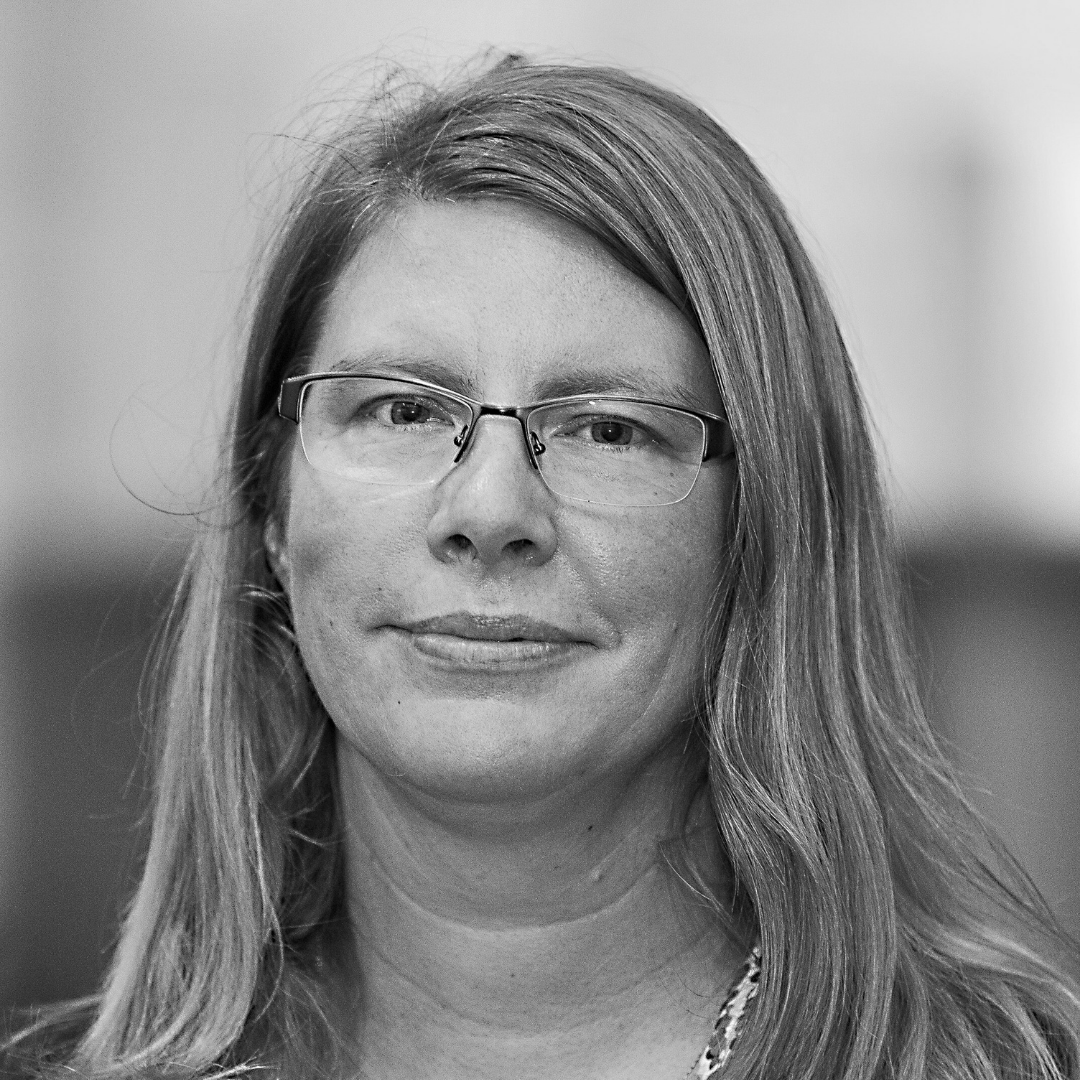WAR IN EUROPE
Russian information weapons
The European Union has banned broadcasting by Russian state media. However, disinformation disseminated by RT DE is proving a great success in Germany, as the channel is still online.
TEXT: SUSANNE SPAHN

WAR IN EUROPE
Russian information weapons
The European Union has banned broadcasting by Russian state media. However, disinformation disseminated by RT DE is proving a great success in Germany, as the channel is still online.
TEXT: SUSANNE SPAHN
At the beginning of March, the European Union banned the broadcasting of Russian state media. “Sputnik and Russia Today are under the permanent direct or indirect control of the authorities of the Russian Federation and are essential and instrumental in bringing forward and supporting the military aggression against Ukraine, and for the destabilisation of its neighbouring countries,” according to a statement by the Council of the European Union. The measures should stay in force “until the aggression to Ukraine is put to an end, and until the Russian Federation and its associated outlets cease to conduct disinformation and information manipulation actions against the EU and its member states.”
In spite of the ban, RT DE has continued to broadcast. The Berlin-Brandenburg media regulator imposed a 25,000 euro fine on RT DE Productions GmbH, as the channel did not stop broadcasting on 4 March as it was supposed to. The TV programme has been stopped since then but the web content remains available. “The voice of RT DE is supposed to be silenced. But we’re still here,” wrote the editor in a message to readers on 6 March. The RT DE website is now available under three new URLs.
“The voice of RT DE is supposed to be silenced. But we’re still here.”
REACTION OF RT DE
1.4 million users
The editor-in-chief of RT in Moscow, Margarita Simonyan, has always referred to the foreign broadcaster expressly as an “information weapon“. Her strategy is to create an alternative public sphere going against the mainstream outside Russia and thus acquire users who are ready to “fight the system.” Besides the EU and US, the information war targets ex-Soviet states such as Ukraine, Georgia and Moldova, which pursue a pro-Western foreign policy. “The collective West” is portrayed as a threat and hindrance to Russia.
The strategy of creating an alternative public sphere and a platform for critics of the system has proved extremely successful in Germany. First there was the refugee crisis, then Brexit, finally the corona crisis: RT branch RT DE has tapped into people’s dissatisfaction and thus rapidly increased viewing figures. Right-wing circles and Pegida activists, EU sceptics and critics of the anti-corona measures saw their views echoed at RT DE and found a journalistic platform there. RT DE increased its audience to 1.4 million users by September 2021 and presented itself as the “leading alternative news source“.
Control from Moscow
Since the start of 2021, the German editor at RT has made a point of improving its dubious image among the general public, with Dinara Toktosunova as editor-in-chief and Alexander Korostelev as programme director. The two, meanwhile, repeatedly deceived the public by claiming that the channel was distinguished “by its profound independence”. RT DE, like the news platform SNA (Sputnik), is controlled and financed from Moscow.
The closure of RT DE’s YouTube channels, which cost RT DE about 600.000 users, caused a scandal in September 2021.
“An anti-Merkel thing“
In the spring of 2021, a former RT DE reporter, Daniel Lange, caused particularly bad press about the foreign broadcaster. He revealed to the “Bild-Zeitung” newspaper how he felt abused when he was supposed to observe the Russian opposition member Alexei Navalny in hospital as he was being treated for poisoning in Berlin. At the same time, he published his book “Inside RT Deutsch: Russlands Medienarmee in Deutschland” (Inside RT Deutsch: Russia’s Media Troops in Germany). The aim of his work at RT was to “produce fake journalistic content” in order to create an “anti-Merkel thing”. It was no coincidence that RT DE disseminated extreme content, he said, because this corresponded to the staff structure. According to Lange, RT DE employs right-wingers, left-wingers, conspiracy fantasists, activists belonging to the Querdenker (“lateral thinkers”) movement and Russian speakers who are absolutely loyal to the ruler Vladimir Putin. Lange said the right-wing circle was particularly large, and some of them had organisational ties to the German right-wing party AfD.
The goal of reaching a broad public was linked in particular to the plan to offer RT DE as a generalist TV channel via cable and satellite. This plan had failed, mainly because as a state-financed medium, RT DE cannot legally obtain a licence in Germany. The relevant media authority Berlin-Brandenburg (MABB) had already indicated to RT DE in advance that “the requirement of state neutrality applies to all forms of broadcasting”. In order to circumvent German regulations, RT's parent company, TV Novosti, applied for a broadcasting licence in Luxembourg. However, the government in Luxembourg rejected this in August 2021, saying it was not competent, as the channel operated mainly in Germany.
The closure of RT DE’s YouTube channels, which cost RT DE about 600.000 users, caused a scandal in September 2021. The American company justified its ban by saying that RT DE had repeatedly spread disinformation about the coronavirus and violated community guidelines. The Russian Foreign Ministry then spoke of an “unprecedented act of media aggression” supported by German authorities. The German government rejected these accusations. “This is a decision by YouTube,” said Steffen Seibert, the government spokesperson at the time.
Nevertheless, Simonyan claimed on Russian television that Luxembourg, Germany and the United States were conspiring against RT DE. She gave the impression that RT DE had been completely blocked and there was no possibility at all of restoring the YouTube channels. This did not match up to the facts: the RT DE website as well as RT DE’s Facebook, Twitter, Instagram and Telegram accounts remained active and accessible; about 800,000 users were still able to use RT DE.

TV journalist Marina Ovsyannikova is holding up an anti-war sign during a live news broadcast on Russian state media.

TV journalist Marina Ovsyannikova is holding up an anti-war sign during a live news broadcast on Russian state media.
No licence
In December 2021, RT DE “solved” the problem of not having a licence in Germany with a broadcasting permit from Serbia and went live via satellite and online stream. However, the Berlin media authority MABB found this unacceptable and imposed a broadcasting ban on RT DE. The Commission on Licensing and Supervision (ZAK) of the regulatory authorities confirmed this decision in early February. One day later, the Foreign Ministry in Russia promptly retaliated: Deutsche Welle (DW) had to close its office in Russia and its correspondents had their accreditations withdrawn. The broadcasting of DW programmes in Russia was banned, and the station found itself entered in the register of so-called foreign agents at the Ministry of Justice of the Russian Federation, making its work considerably more difficult. The DW ban thus went much further than the measures imposed on RT DE in Germany. Unlike DW correspondents in Russia, RT staff in Germany can continue to work unhindered.
After Russia's attack on Ukraine on 24 February, Russia cracked down hard on foreign and independent Russian media: the websites of the BBC, Deutsche Welle, the Echo Moskvy radio station, TV Doschd and others were blocked.
Prison terms for “fake news“
After Russia's attack on Ukraine on 24 February, Russia cracked down hard on foreign and independent Russian media: the websites of the BBC, Deutsche Welle, the Echo Moskvy radio station, TV Doschd and others were blocked. Disseminating “fake news” about the war is punishable by a fine of 1.5 million roubles or up to ten years in prison. Calling the war a war is also considered “fake news”. As a result of this media law, ARD and ZDF stopped their reporting from Moscow. RT DE, on the other hand, continues to operate despite all bans and spreads the Kremlin propaganda lies of the “special operation” to “pacify” and “denazify” Ukraine. In that world, it is not Russia that is the aggressor, but rather Ukraine and the West. In Germany, there are voices, for example Reporters Without Borders, who speak out against a ban on RT DE in the name of press freedom. At the same time, the Russian state media are currently making it crystal clear that they are weapons in the information war.

Susanne Spahn is a Berlin-based historian, political scientist and journalist.

Susanne Spahn is a Berlin-based historian, political scientist and journalist.
More articles
Wolfram Eilenberger // Russia’s work and Germany’s contribution
Putin‘s invasion of Ukraine has shaken German politics out of its naivety. How could the country so collectively succumb to such a dangerous misconception?
Karen Horn // “Putin‘s ideology is the sacralisation of war“
The horrific actions of the Russian ruler appear on the news every day. And his comments are bewildering. What on earth is going on in the head of the former KGB spy in the Kremlin? Philosopher Michel Eltchaninoff has researched the origins of the Putin school of thought and the ideology he has formed.
Irina Borogan und Andrej Soldatow // Propaganda and repression
Freedom of opinion is a thing of the past in Russia. State television disseminates disinformation, independent media are harassed.
